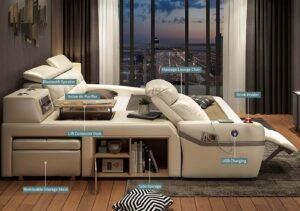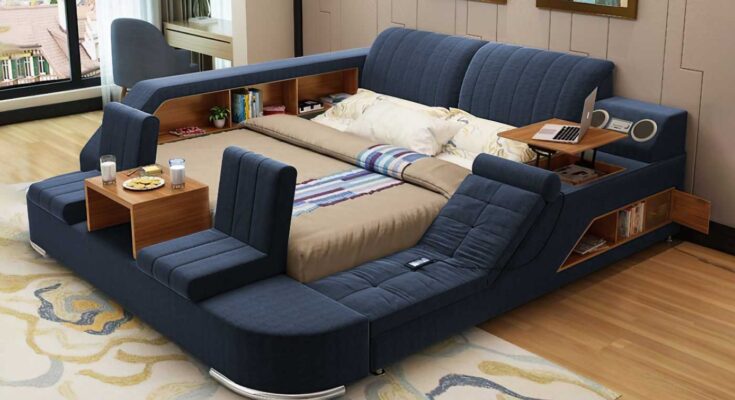In today’s fast-paced world, getting a good night’s sleep is more important than ever. With the advent of smart technology, the concept of a “smart bed” has emerged, promising to revolutionize sleep and enhance overall well-being. These innovative beds are equipped with advanced features and technologies that monitor, analyze, and optimize sleep patterns. We explore the growing demand for smart beds, the sales figures, prominent manufacturers, and the latest trends shaping the future of sleep technology in this article.
1. The Increasing Demand for Smart Beds
The demand for smart beds is on the rise as people become more conscious of the importance of quality sleep. Factors such as increased awareness of sleep health, rising stress levels, and the desire for personalized sleep experiences have fueled the demand. Smart beds offer features like adjustable firmness, temperature control, sleep tracking, and even smart alarms, catering to individual preferences and optimizing sleep quality.
2. Sales Figures Reflecting the Growing Market
The sales of smart beds have witnessed a significant surge in recent years. According to Fact.MR market research, the global smart bed market is projected to reach a value of US$ 3.42 billion in 2023, with a compound annual growth rate of over 7%. The increasing adoption of smart home technology, coupled with the rising demand for premium sleep experiences, has contributed to this exponential growth in sales of smart beds.
3. Prominent Smart Bed Manufacturers
Several manufacturers have stepped into the smart bed market, offering a range of innovative products. Companies like Sleep Number, Eight Sleep, Tempur-Pedic, and Beautyrest are leading the way with their cutting-edge sleep technologies. These manufacturers integrate features like sleep tracking sensors, adjustable bases, intelligent temperature control, and smart home integration, providing users with personalized comfort and sleep optimization. The manufacturers focused on in the report include,
- Invacare Corporation
- Paramount Bed Co.
- Stryker Corporation
- BodiTrak
- Hill Rom Holdings Inc.
- Ultimate Smart Bed
- Arjo AB
- Sleep Number Corporation
- Tempur Sealy International, Inc.
- Serta Simmons Bedding, LLC
- Ergomotion Inc. & 16 more..
Check for More Details
Trends Shaping the Future of Smart Beds
The future of smart beds holds exciting possibilities. Some notable trends include:
Sleep Tracking and Analysis

Smart beds collect data on sleep patterns, heart rate, and movement during the night. This data is analyzed to provide detailed insights into sleep quality and suggest improvements for better rest.
AI and Machine Learning Integration
Smart beds are becoming smarter with the integration of artificial intelligence and machine learning algorithms. This allows the bed to learn an individual’s sleep patterns, adjust settings automatically, and offer personalized sleep recommendations.
Health and Wellness Features
Smart beds are evolving beyond sleep optimization to include health and wellness features. These may include built-in massage options, anti-snoring capabilities, and even biometric sensors to monitor vital signs during sleep.
Integration with Smart Home Systems
Smart beds seamlessly integrate with other smart home devices, enabling users to control their bed settings, lighting, temperature, and more through voice commands or smartphone apps.
Seamlessly Integrating with Smart Home Systems
– Smart bed integration with smart homes enhances control and customization.
– Adjust bed settings with voice commands or smartphone apps.
– Synchronize with other smart home devices for a harmonious sleep environment.
– Create the ideal ambiance for winding down and waking up.
– Seamlessly integrate sleep data into your smart home’s wellness ecosystem.
Benefits offered by Smart Beds
Smart beds offer a range of benefits that can greatly enhance the sleep experience and overall well-being of individuals. Here are some key benefits of smart beds:

1. Personalized Comfort: Smart beds allow users to customize their sleep experience by adjusting settings such as firmness, elevation, and temperature. This personalized comfort can help alleviate pressure points, improve spinal alignment, and promote better sleep quality.
2. Sleep Tracking and Analysis: Smart beds come equipped with sleep tracking sensors that monitor sleep patterns, heart rate, and movement during the night. This data is analyzed to provide insights into sleep quality, duration, and disturbances. By understanding their sleep patterns, individuals can make informed decisions to optimize their sleep habits and improve overall sleep health.
3. Sleep Optimization Features: Many smart beds offer sleep optimization features that aim to enhance the sleep experience. These may include smart alarms that wake individuals up during their lightest sleep phase, reducing grogginess and promoting a more refreshed awakening. Additionally, some smart beds can adjust firmness and position automatically throughout the night to promote better sleep posture and reduce discomfort.
4. Health and Wellness Benefits: Some smart beds incorporate additional health and wellness features. For example, built-in massage options can help relax muscles and alleviate stress. Anti-snoring capabilities can detect snoring and adjust the bed’s position to open airways and reduce snoring intensity. These features can contribute to improved sleep quality and overall well-being.
5. Smart Home Integration: Smart beds can seamlessly integrate with other smart home devices, allowing users to control their bed settings, lighting, temperature, and more through voice commands or smartphone apps. This integration enhances convenience and creates a more holistic and connected sleep environment.
6. Partner Compatibility: Many smart beds offer dual-zone settings, allowing partners to customize their side of the bed independently. This feature is particularly beneficial when partners have different sleep preferences or require specific adjustments for optimal comfort.
Conclusion
Smart beds are transforming the way we sleep, offering personalized comfort, sleep tracking, and optimization features. With the increasing demand and sales figures reflecting the growing market, prominent manufacturers are continuously innovating to offer the latest technologies. As trends like AI integration, health and wellness features, and smart home integration shape the future, the potential for smart beds to revolutionize sleep technology and enhance overall well-being is vast. Embracing this technological advancement can lead to a more restful and rejuvenating sleep experience for individuals worldwide.
Also Read:
1. Powering the Future: The Advancements and Applications of SiC and GaN Power Semiconductors
2. Autonomous Vehicles and Integration of IoT to Create Several Market Opportunities for LiDAR Sensors



